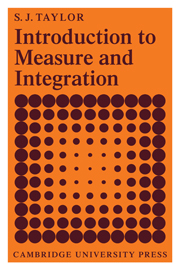Book contents
- Frontmatter
- Contents
- Preface
- 1 Theory of sets
- 2 Point set topology
- 3 Set functions
- 4 Construction and properties of measures
- 5 Definitions and properties of the integral
- 6 Related spaces and measures
- 7 The space of measurable functions
- 8 Linear functionals
- 9 Structure of measures in special spaces
- Index of notation
- General Index
- Frontmatter
- Contents
- Preface
- 1 Theory of sets
- 2 Point set topology
- 3 Set functions
- 4 Construction and properties of measures
- 5 Definitions and properties of the integral
- 6 Related spaces and measures
- 7 The space of measurable functions
- 8 Linear functionals
- 9 Structure of measures in special spaces
- Index of notation
- General Index
Summary
There are many ways of developing the theory of measure and integration. In the present book measure is studied first as the primary concept and the integral is obtained later by extending its definition from the special case of ‘simple’ functions using monotone limits. The theory is presented for general measure spaces though at each stage Lebesgue measure and the Lebesgue integral in Rn are considered as the most important example, and the detailed properties are established for the Lebesgue case.
The book is designed for use either in the final undergraduate year at British universities or as a basic text in measure theory at the postgraduate level. Though the subject is developed as a branch of pure mathematics, it is presented in such a way that it has immediate application to any branch of applied mathematics which requires the basic theory of measure and integration as a foundation for its mathematical apparatus. In particular, our development of the subject is a suitable basis for modern probability theory – in fact this book first appeared as the initial section of the book Introduction to measure and probability (Cambridge University Press, 1966) written jointly with J. F. C. Kingman.
The book is largely self-contained. The first two chapters contain the essential parts of set theory and point set topology; these could well be omitted by a reader already familiar with these subjects. Chapters 3 and 4 develop the theory of measure by the usual process of extension from ‘simple sets’ to those of a larger class, and the properties of Lebesgue measure are obtained.
Information
- Type
- Chapter
- Information
- Introduction to Measure and Integration , pp. v - viPublisher: Cambridge University PressPrint publication year: 1973
